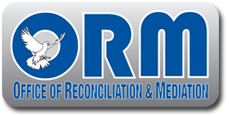April 2020 Monthly Letter

Dear ORM Reconcilers,
I am sure you will enjoy the April letter written by our guest contributor, Neil Earle. Jannice and I wish you a Happy Easter.
RESURRECTION HOPE
April is usually the month when Western Christians commemorate the resurrection of Jesus Christ from the dead.
Easter vividly reminds us of the One whom Herod could not kill, the Romans could not silence, and the grave could not hold. This remembrance inspires Christian teachers to proclaim that Christian hope is resurrection hope, a lively expectation as real as the very earth from which Christ’s tomb was carved.
Christ’s resurrection from a rock tomb gives us the hope to carry on in our challenging quest toward the light of redemption and reconciliation. Christians believe that Easter Sunday is the pivot upon which all history turns for Jesus’ resurrection, and ascension is the supreme token that the future will go as He taught—the certain future when justice will triumph at last and the creation itself will be redeemed and reconciled more perfectly to its Creator (Luke 20:1-16; Romans 8:20-21).
In the meantime, reconcilers draw upon Resurrection Hope even now. We act in light of what is coming, what will be the ultimate reality, the fulfillment of God’s plan “to unite all things in him, things in heaven and things on earth” (Ephesians 1:10). “The risen Christ does not just come to the dead,” writes Jurgen Moltmann, “he draws all things into his future, so that they may become new and participate in God’s eternal joy.”
With that certain future before us we seek out workable tools of reconciliation wherever they may be found. Pastor Curtis DeYoung explains how Palestinian villagers deal with the hard work of peacemaking and forgiveness for local offenses:
First, a mediator is chosen.
Second, a date is set to visit the offended person’s home and to invite the extended family — offense is a community matter.
Third, the offender brings his family and the mediator.
Fourth, the offender admits his part in the problem and asks for forgiveness.
Next, the mediator assesses procedures that work toward repairing the damage.
Then, forgiveness is extended. “You are in our home. You are one of us and we take it upon ourselves to help and protect the person who has done us wrong.”
“Samah min Allah” is recited — “forgiveness is a gift of God.”
Finally, all share in a communal meal.
Christians will surely catch echoes here of workable reconciliation steps expounded by another Palestinian villager, Jesus of Nazareth (Matthew 18:15-20). The Lord’s Supper he established allows us to go forward together united in his name.
Happy Easter and may that Resurrection Hope never leave us.
(Guest contributor Neil Earle teaches church history and can be found online at asecondlook.info.)
